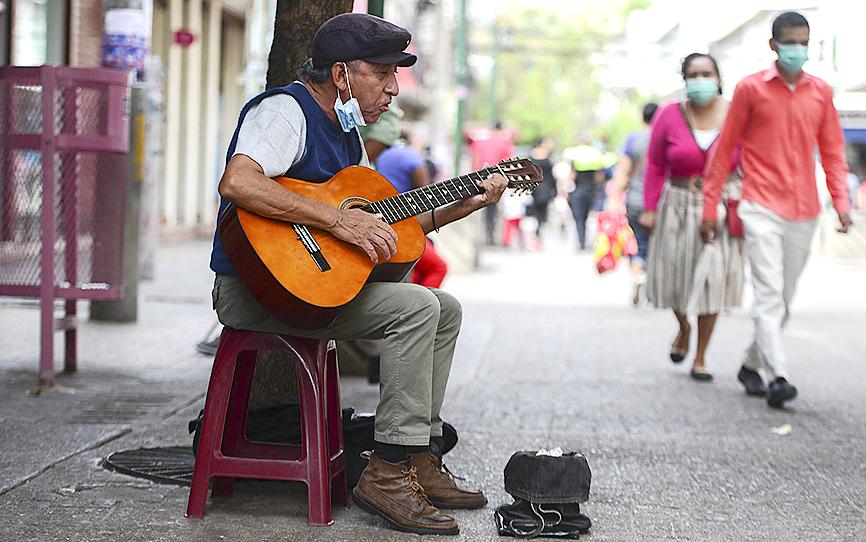A visiting US delegation on Wednesday made clear to both of the leading presidential candidates in Honduras’ election on Sunday that Washington wants the country to maintain its long-standing diplomatic relations with Taiwan, a senior US Department of State official said.
The official, speaking on condition of anonymity, also said that Washington has warned Central American nations of “some of the risks associated with China’s approach to the region.”
Xiomara Castro, the main opposition candidate, who was leading in the latest polls, has previously said that if victorious, she would switch diplomatic relations from Taiwan to Beijing, but one of her aides said on Tuesday that no final decision had been made.

Photo: AFP
“We’ve been quite clear with all the key actors in Honduras why we think the Honduras-Taiwan relationship is so important,” a US Department of State official told reporters in a telephone briefing.
“We’d like to see that continue. We’ve said that to both of the leading candidates directly,” the official said, referring to meetings with a delegation led by US Assistant Secretary of State for the Western Hemisphere Brian Nichols.
In Taipei yesterday, the Ministry of Foreign Affairs thanked the US and reiterated its commitment to Honduras.
Taiwan and the US share universal values of freedom, democracy and human rights, ministry spokeswoman Joanne Ou (歐江安) said in a statement, adding that it thanked Washington for urging Taiwan’s diplomatic allies to maintain ties.
Since the relationship between Taiwan and Honduras began 80 years ago, ties have been steady and friendly, Ou said.
The ministry is fully aware of China’s ceaseless attempts to sabotage Taiwan’s diplomatic efforts, she said.
The ministry would work closely with the US and other like-minded countries to foster prosperous development in Honduras and elsewhere in Central America, she said.
Ou reiterated the ministry’s respect for Honduras’ elections, saying that it would develop practical and mutually beneficial ties with any new government in Tegucigalpa.
In Beijing, the Chinese Ministry of Foreign Affairs accused the US of “arm-twisting” after the delegation made it clear that Washington wants Honduras to maintain its ties with Taiwan.
Chinese ministry spokesman Zhao Lijian (趙立堅) said that the US would not win any friends this way.
“This arm-twisting and bullying behavior will not win any hearts and minds,” Zhao told reporters.
People in Central America should watch out for the US’ “hegemonic behavior,” Zhao said, pointing to US involvement in coups and other plots in the region.
“Two hundred years on, the United States is still dreaming the old dream and treating Latin American countries as within its sphere of influence,” he said. “This bullying behavior is abhorred by Latin Americans and will surely fail.”
Additional reporting by Lin Chia-nan

INVESTIGATION: The case is the latest instance of a DPP figure being implicated in an espionage network accused of allegedly leaking information to Chinese intelligence Democratic Progressive Party (DPP) member Ho Jen-chieh (何仁傑) was detained and held incommunicado yesterday on suspicion of spying for China during his tenure as assistant to then-minister of foreign affairs Joseph Wu (吳釗燮). The Taipei District Prosecutors’ Office said Ho was implicated during its investigation into alleged spying activities by former Presidential Office consultant Wu Shang-yu (吳尚雨). Prosecutors said there is reason to believe Ho breached the National Security Act (國家安全法) by leaking classified Ministry of Foreign Affairs information to Chinese intelligence. Following interrogation, prosecutors petitioned the Taipei District Court to detain Ho, citing concerns over potential collusion or tampering of evidence. The

NEGOTIATIONS: Taiwan has good relations with Washington and the outlook for the negotiations looks promising, Minister of Economic Affairs J.W. Kuo said Taiwan’s GDP growth this year is expected to decrease by 0.43 to 1.61 percentage points due to the effects of US tariffs, National Development Council (NDC) Minister Paul Liu (劉鏡清) said at a meeting of the legislature’s Economics Committee in Taipei yesterday, citing a preliminary estimate by a private research institution. Taiwan’s economy would be significantly affected by the 32 percent “reciprocal” tariffs slapped by the US, which took effect yesterday, Liu said, adding that GDP growth could fall below 3 percent and potentially even dip below 2 percent to 1.53 percent this year. The council has commissioned another institution

NEGOTIATIONS: The US response to the countermeasures and plans Taiwan presented has been positive, including boosting procurement and investment, the president said Taiwan is included in the first group for trade negotiations with the US, President William Lai (賴清德) said yesterday, as he seeks to shield Taiwanese exporters from a 32 percent tariff. In Washington, US Trade Representative Jamieson Greer said in an interview on Fox News on Thursday that he would speak to his Taiwanese and Israeli counterparts yesterday about tariffs after holding a long discussion with the Vietnamese earlier. US President Donald Trump on Wednesday postponed punishing levies on multiple trade partners, including Taiwan, for three months after trillions of US dollars were wiped off global markets. He has maintained a 10 percent

TRADE: The premier pledged safeguards on ‘Made in Taiwan’ labeling, anti-dumping measures and stricter export controls to strengthen its position in trade talks Products labeled “made in Taiwan” must be genuinely made in Taiwan, Premier Cho Jung-tai (卓榮泰) said yesterday, vowing to enforce strict safeguards against “origin laundering” and initiate anti-dumping investigations to prevent China dumping its products in Taiwan. Cho made the remarks in a discussion session with representatives from industries in Kaohsiung. In response to the US government’s recent announcement of “reciprocal” tariffs on its trading partners, President William Lai (賴清德) and Cho last week began a series of consultations with industry leaders nationwide to gather feedback and address concerns. Taiwanese and US officials held a videoconference on Friday evening to discuss the